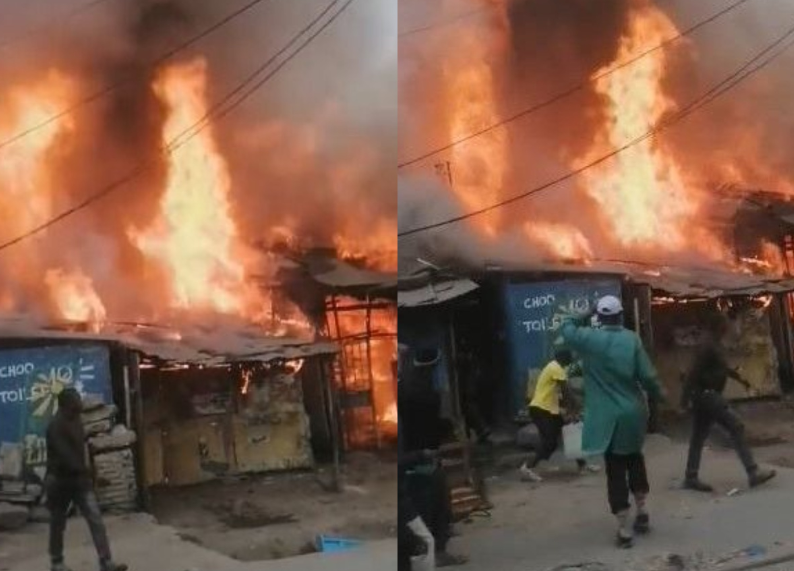 A tragic fire swept through the Mathare informal settlement in Nairobi, leaving over 50 residents homeless and destroying dozens of homes. The blaze, which started late on Saturday night, reduced much of the densely populated area to ashes, displacing families and sparking calls for enhanced safety measures in Kenya’s informal settlements.
A tragic fire swept through the Mathare informal settlement in Nairobi, leaving over 50 residents homeless and destroying dozens of homes. The blaze, which started late on Saturday night, reduced much of the densely populated area to ashes, displacing families and sparking calls for enhanced safety measures in Kenya’s informal settlements.
The fire reportedly began in one of the makeshift homes in Mathare Area 3, likely caused by an electrical fault, according to initial investigations. The flames spread rapidly due to the tightly packed structures and combustible materials such as wood and iron sheets.
Witnesses described a chaotic scene as residents scrambled to salvage their belongings. Many were caught off-guard, with some losing everything they owned in a matter of minutes. I was asleep when I heard people shouting said a resident, by the time I got out my house was already on fire, I have nothing left.
Firefighters from the Nairobi County Fire Department arrived on the scene but faced challenges accessing the area due to narrow pathways and blocked roads. Local youths formed human chains to help extinguish the fire using buckets of water, but their efforts were no match for the intensity of the flames.
Although no fatalities were reported, several people sustained minor injuries while trying to escape or save their property. The displaced families have sought temporary shelter in churches, schools, and with neighbors as they await government assistance.
Non-governmental organizations and local leaders have rallied to provide immediate aid. Relief efforts, including food, clothing, and bedding, are being coordinated to support the affected families. However, the scale of the destruction has overwhelmed available resources, prompting appeals for more help.
We are urging well-wishers to come forward and assist these families said a representative from the Red Cross. They have lost everything and are in desperate need of food, shelter, and basic supplies.
Fires are a frequent occurrence in Nairobi’s informal settlements, where unregulated housing, illegal electricity connections, and lack of firefighting infrastructure create a perfect storm for disasters. Mathare, one of the largest slums in Kenya, is home to thousands of residents who live in precarious conditions.
This is not the first time we are experiencing such a tragedy lamented local leader. Until we address the underlying issues of poor housing and lack of infrastructure these fires will keep happening.
In a statement, Nairobi Governor Johnson Sakaja expressed sympathy for the victims and promised swift action to support the affected families. He also reiterated his administration’s commitment to upgrading informal settlements through affordable housing projects and improved public services.
Civil society groups have called for more proactive measures, including stricter enforcement of safety regulations and better urban planning. “It is unacceptable that year after year, we lose lives and property to preventable fires,” said a representative from Amnesty International Kenya.
For the displaced families, the immediate focus is on rebuilding their lives. However, the tragedy underscores the urgent need for long-term solutions to improve the living conditions in Kenya’s slums.
As residents of Mathare come together to support one another, their resilience is a testament to the community’s strength. Yet, without meaningful intervention, the cycle of poverty and vulnerability will persist, leaving thousands at risk of similar tragedies.
The Mathare fire serves as a grim reminder of the challenges faced by informal settlements and the critical importance of addressing them to prevent future disasters.

